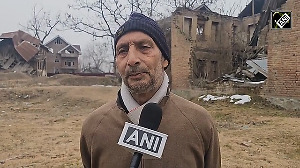India are taking a trip to Japan for a World Cup qualifier next week, a journey to another galaxy in soccer terms.
Twice Asian Games winners, in the inaugural edition in 1951 and again in 1962, India's 6-7 win-loss record against Japan is not bad at first glance.
However, the last of those wins was way back in the bronze medal playoff at the 1970 Asian Games, before Japan became Asia's soccer powerhouse and India began their slide towards obscurity.
Wednesday's Asian zone game in Saitama is a mismatch which is likely to reveal all that has gone wrong in Indian soccer.
For coach Stephen Constantine's side, demoralised by a 5-1 defeat by Oman in their last home fixture, escaping with a narrow defeat would be a great achievement.
India are ranked 139th in the world and 27th among the 45 Asian nations. Critics point the finger of blame at Indian administrators and the myopic vision of the few quality clubs.
DULL LEAGUE
Millions of people in cricket-crazy India become soccer converts during major events like the World Cup and European Championship and they follow the major European leagues keenly on television.
Few among them, however, are interested in the country's national league, started eight years ago and now suffering a host of problems including lack of sponsorship and unimaginative scheduling.
"The current home and away format is a westernised concept which can't work in a vast country like India," says soccer expert Novy Kapadia.
The All India Football Federation channels a lot of energy into the league which has led only to crowds and clubs turning their backs on popular tournaments.
"Tournaments were the lifeline in India, they used to be like festivals with players looking forward to them," Kapadia said.
The game is now confined to small pockets in the east and south.
India's sharp decline since the early 1980's has coincided with the growth of professionalism in Asia, led by Japan and South Korea, co-hosts of the 2002 World Cup.
LOST OPPORTUNITIES
"It is a story of lost opportunities. Look at Japan - they started their professional league in 1992-93 and see where they are," said Kapadia.
Constantine blames clubs for recruiting sub-standard foreign players, mostly Africans, at the expense of local talent.
"There is not enough emphasis on tapping talent," the British coach said. "Thousands of youngsters are not even getting the chance to know how good they are, even in big cities."
Kalyan Mazumdar, secretary of India's champions East Bengal, says lack of funds lay at the root of all the problems.
"There is sponsorship only for cricket, nobody comes forward for football. We beg, borrow and steal to run the show."
In a bid to revitalise Indian soccer, the Asian Football Confederation (AFC) has compiled a report which lays most of the blame at the feet of the administrators.
"There is no substitute for professionalism and planning," admitted AIFF secretary Albert Colaco.
However, he dismissed as "Utopian" suggestions for expanding the league, adding more professional administrators and allowing clubs to end their dependence on public stadiums by acquiring their own grounds.
"The AFC has made some good suggestions but we need a lot of money for these. They don't give us anything."








 © 2025
© 2025